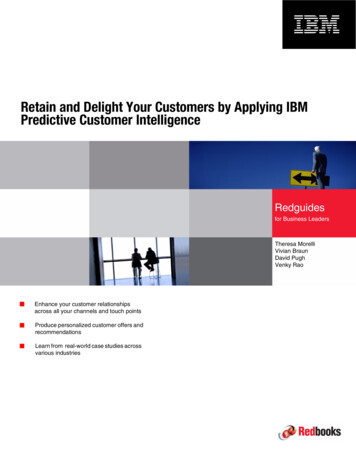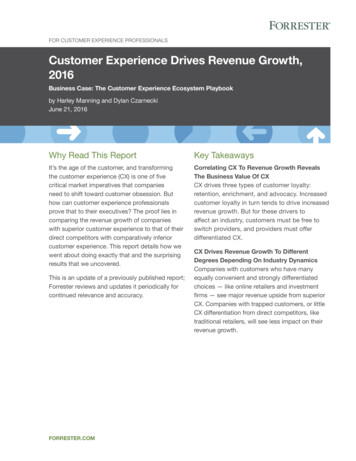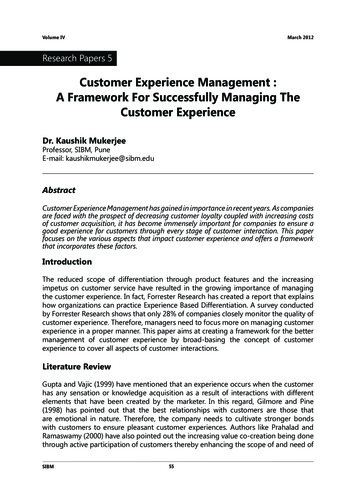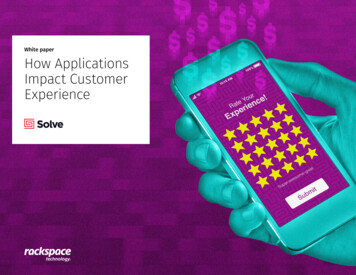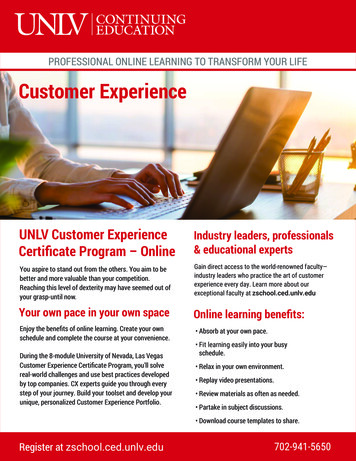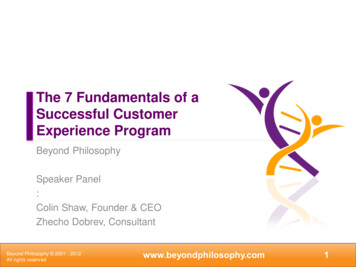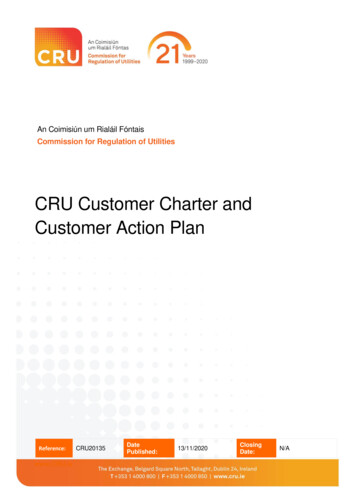
Transcription
Customer experience:Learning from online personal finance conversationsCustomer experience: learningfrom online personal financeconversationsConsumers are increasingly turning to new, digitally nativebanking and investment services from fintech competitors tothe high-street incumbents. New research from The EconomistIntelligence Unit, based on an analysis of over 10m conversationsin public forums about personal finances, has sought to betterunderstand consumer preferences when it comes to retailbanking services. It finds that: Fintech start-ups are strongly associated with financialempowerment, but also twice as likely to be associated withsecurity and privacy concerns when compared to traditionalbanks. Traditional banks retain strong associations withtrustworthiness, a wider range of services and perks such asloyalty programmes.In the battle for consumers, there remains everything to play for.Digital and traditional banks are engaged in a fierce battle forcustomers. Start-up, digital-first banks and investment services, such asMonzo, N26 and Robinhood, have come to market promising superiorcustomer experience and a rich array of services, such as budgetingapps and automated, low-cost investment tools. But traditional banksstill benefit from trust, reliability and a wider range of services. Andincreasingly, spurred on by a crowded field of agile new digital upstarts,they are investing heavily in their digital capabilities—to great effect.SPONSORED BY The Economist Intelligence Unit Limited 20201
Customer experience:Learning from online personal finance conversationsKey to this battle between old and new iswhether innovators can scale up and broadentheir appeal faster than incumbents caninnovate.Our research methodologyWe analysed over 10m onlineconversations about finance andbanking dating back to 2013, drawnfrom English-language personalfinance forums on Reddit, a socialdiscussion website. The samplereflects a global community of Englishspeakers, predominately from theUK and US. Using machine-learningalgorithms, we sifted millions ofcomments into distinct word clustersto reveal which words and phrasesappear most frequently, and which aremost regularly associated witheach other.A deep understanding of customer behaviourand sentiment will be essential to successfor any financial player, new or old. Oneresource to help firms do this are the millionsof conversations that consumers are havingabout personal finance in public onlineforums. What banking tools and services arecustomers most frequently discussing, in whatterms? Which keywords relating to bankingservices are rising and falling in frequency overtime? Which associations are there betweendiscussions of negative customer experienceand different types of bank?To answer these questions, The EconomistIntelligence Unit (EIU) developed a naturallanguage processing model to analyse over10m online English-language conversationsabout personal finance. The resulting clusters,associations and patterns show key strengthsand weaknesses of traditional and challengerbanks in terms of how well they are meetingcustomer needs.How people talk about their banksOur analysis of millions of conversations on personal finance forums revealed 12 overall language clusters related to retailbanking. Credit card services and reward schemes ('Credit', below) are the most popular topic of conversation today, followedby concerns about identify theft, hacking and fraudulent activity ('Safety').Word ntLanguage es*Banking430,408Budgeting198,564Online banking99,168ATM withdrawals24,146Savings accounts800,0004,351* Traditional banking services like transferring money, making payments and using an overdraft.Note: Chart displays 2018-20 data for a snapshot of recent conversations.Sources: Reddit; EIU/Flamingo analysis. The Economist Intelligence Unit Limited 20202
Customer experience:Learning from online personal finance conversationsFinancial empowerment andcustomer loyaltyAccording to a survey of 305 global bankingexecutives carried out by the EIU, investments(self-executed or robo-advisory) are thenumber one area where new entrants areexpected to gain market share in the comingyears.Largely, next-generation banks have provenpopular because they have used technologyto offer customers richer services than theirconventional counterparts, from spendinganalytics to budgeting tools and low-costinvestment platforms.Discussions about “investment” have grownin frequency since 2015, and our analysisshows that 14.4% of conversations thatdiscuss challenger banks include associationswith financial empowerment capabilitiessuch as tracking and budgeting, comparedwith just 2% of conversations that discusstraditional banks. In response to low interestrates being offered by conventional savingsaccounts, more everyday consumers havetaken advantage of low-cost investmentportfolio services offered by fintech firms andalgorithm-driven “robo-advisors”.Jason Bates, co-founder of app-based banksMonzo and Starling, as well as 11:FS, a fintechconsultancy, believes that challenger bankshave done a better job of understandingcustomer’s financial lives and buildingproducts around them. “Banks haven’t beengreat at delivering services to help deal withthe realities of day-to-day life. They just say,‘great to see you, here’s your balance, hereare your transactions, here is how you movemoney. Good luck. And if you spend morethan you’ve got, we’ll charge you’”.He distinguishes here between “digitisation”,where banks simply move their paper orin-person branch processes online and intoImproving customer experience and engagement is banks' top strategic priorityWhat are the top strategic priorities for your company by 2025? Select up to two.(% of respondents)0510152025Improving customer experience and engagement(including personalisation, intimacy)3032Migrating client usage to digital fromphysical channels31Mastering digital marketing31Improving product agility(the ability to launch new products)2623Lauching an open banking strategyCutting costs or improving margins22Talent acquisition and retentionResponding to regulatory requirements35139Source: The Economist Intelligence Unit. The Economist Intelligence Unit Limited 20203
Customer experience:Learning from online personal finance conversationsConversations about challenger and traditional banks comparedWe analysed conversations that mention traditional banks and challenger banks to determine what percentage of thoseconversation sets relate to key personal finance issues—such as financial empowerment or security concerns.Conversations about traditionalbanks2%Conversations about challengerbanks14.4%Relate to points and reward programmes24.9%2.4%Relate to safety, security or privacy concerns6.7%13.7%Relate to financial empowerment capabilities,such as tracking and budgetingapps, to truly “digital” innovation that imaginesnew services. Digitisation is analogousto the re-creation of a newspaper on aniPad. Digital transformation, in contrast, isexemplified in new media platforms, suchas iTunes or Spotify. “The operating modelhere fundamentally changed. It’s not onlyabout music—it is also about discovery andsharing.” In the financial services space, MrBates believes, truly digital innovations will bethose that are real-time, intelligent, social orcontextual.But while many consumers are turningtowards disruptive fintech platforms forenriched tools and services to bolster theirpersonal finances, traditional banks remainheavily associated with rewards and loyaltyprogrammes—one of the most discussedsubjects overall. In our analysis, a quarter(24.9%) of conversations about traditionalbanks were related to credit cards or rewardprogrammes, compared to just 2.4% of thoseinvolving challengers. Here traditional banksbenefit from their age and experience, havingbuilt up significant loyalty with customers(whose perks accumulate over the years),and leveraging the reputation and reliabilityneeded to strike commercial partnershipswith companies in sectors like air travel andhospitality.In the future, loyalty programmes and pointsschemes will be a customer experiencedomain that will benefit from better data andanalytics about customer preferences andbehaviours, leading to more tailored offerings.In this environment, it is more than possiblefor fintech firms to excel in points and perksservices, provided that their brands are strongenough to form the right partnerships.Fintech firms are already making in-roads.Point, a new US challenger bank whoseinvestor roster includes backers of N26 andTransferWise, offers cash-redeemable pointsfor groceries as well as services like Netflixand Spotify. Another US digital bank, Current,offers points on transactions at participatingmerchants, which include Subway and RiteAid, although currently the cash can onlybe spent on upgrading to the bank’s ownpremium service. Some firms are flipping theentire points model on its head: US-basedTally gives users points for saving, which theycan redeem for gift cards at retailers such asAmazon and Target, and services includingUber. Time will tell if non-traditional bankscan sustain points systems, given their netcost, especially during the early (usually lossmaking) years. The Economist Intelligence Unit Limited 20204
Customer experience:Learning from online personal finance conversationsSafety and security: favouring thetried and trustedIf challenger banks have brought to marketbetter customer experience and enhancedservices, traditional banks still have animportant advantage in terms of trust andreliability. Our analysis found that 13.7%of conversations about challenger banksincluded associations with concerns aboutsafety, security or privacy, compared with only6.7% of those about traditional banks.Privacy is a major subject, particularly forfintech services that link different institutions’financial data. In discussions of retail banking,safety was the only language cluster toexperience significant proportional growthover time, a consequence of a broaderconcern about digital privacy in recent years,heightened by high-profile cyber hacks anddata breaches.Many prominent challenger banks haveslipped up on security and reliability, includingthrough service outages and glitches. Theyhave also had run-ins with regulators andfaced criticism over issues such as capitaladequacy ratios, anti-money-launderingprotocols, audit quality, and consumervulnerability in areas like investing. Withchallenger banks and fintech platforms oftenstill in the venture-funded, pre-profit phase,there are questions about their long-termsurvival that could limit their ability to becomeprimary providers of services—especially in atime of such economic uncertainty. This mayput pressure on their appeal as they seek todevelop from scale to profitability.Customer experience: the survivalimperativeFor newcomers and incumbents, customercentricity is a widely shared priority. In theglobal banking survey conducted by the EIUas part of this research programme, improvingcustomer experience and engagement,including personalisation, was cited as the topstrategic priority through to 2025 and a topthree factor impacting banks.“Core financial services are becoming morecommoditised, and price competition onlygoes so far,” says Millie Gillon, global headof retail banking customer experience atStandard Chartered bank. “If we can’t win onprice alone, we need to focus on experience.That will help us to differentiate”. Someincumbents have strengthened their customerexperience offering through acquisitions, suchas CapitalOne’s purchase of Adaptive Path, adesign and user experience consultancy.To flourish in customer experience excellence,banks must find new ways to listen totheir clients—and to understand customertrends more broadly. “There’s a heightenedawareness among established companiesabout the importance of putting clients firstand centre, and then building our offeringsaround them, as opposed to the old methodof, ‘If we build it, they will come,’” says MsGillon.Innovators are those who understand the“brutal realities” of customers’ daily lives, saysMr Bates. “We never ask customers, ‘whatwould you like us to build?’ because they areexperts at talking about their problems andexperience, not product development. Ourapproach to creating new digital services isto talk to customers about the issues in theirdaily life and then look at how you can deliveragainst that.”Ethnographic research, for instance, isallowing Standard Chartered to “dig deep intocustomer’s psychographics”, says Ms Gillon,helping them to understand their motivations,goals and fears. “By doing this, we can startto really understand, empathise and putourselves in their shoes”. The Economist Intelligence Unit Limited 20205
Customer experience:Learning from online personal finance conversationsEverything to play forDiscussion topics in personal finance forums we analysed ranged widely, with most conversations not mentioning banks ortheir services at all. Banks figure in just 18% of total personal finance discussions (shown in purple, below). This suggests ampleopportunity for challenger and high-street banks alike to associate themselves with new areas of personal finance, such as carpurchasing and student debt.Conversation terms relating to retail bankingConversation terms not retail bankingConversations about weeklyshopping and handling housebudgetsCar purchasing, financing andunderstanding a good dealEducation, degrees, paying backstudent debt, expected salariesProperty law, divorce,prenuptial agreementsThis graphic displays the lexicon in personal finance discussion forums. Each word is represented by a circle; the larger the circle, themore frequently it is used. Words close together frequently appear together, with clusters of words identifying different subjects peopletalk about—such as credit card reward programmes or car purchasing.“We want to try to be much more empathetic,because once we have empathy, we’re morehuman. When we’re more human, that’s whenwe can truly be client-centric”.An open thread: customerexperience in transitionAmid the coronavirus crisis, customerpriorities are rapidly changing. “A lot of peopleare just thinking ‘What’s truly important to meright now?’ Because this year, most people’sgoal is just to survive,” says Ms Gillon. They’realso saying, ‘what’s important is not just meas your client but servicing the needs of myentire family.’ It’s much more familial. It’s reallyabout getting down to the root of what’s mostimportant now”.Such shifting priorities threaten the businessmodel of start-ups that have built offerings onperks such as free currency exchange servicesand spending analytics tools, which arelosing relevance at a time of falling earnings.Incumbent banks have seen some advantages,in the form of increased saving (the US savingsrate hit a record 33% in April). But additionalincome from fees and deposits is being morethan offset by falling margins and the need toput aside large quantities to cover loan losses.In this environment, a smart “listening” strategywill not only help banks to know whether theirservices are hitting the mark; it will also givethem insights into market changes.More optimistically, banks are realising thatthe field of “financial services” is far biggerthan ever before. Open banking regulations,which allow third parties to build financialproducts linked to customers’ paymentaccounts, are likely to herald a period ofevolution into a broader “open finance” erathat will apply the same principles to savings,insurance, mortgages, investments, pensionsand credit. The Economist Intelligence Unit Limited 20206
Customer experience:Learning from online personal finance conversationsThis could see fintech become ubiquitous inareas far beyond core banking. Our analysisshows many domains in which consumers discusspersonal finance with no associations withtheir banks at all: the entire class of retail banks(incumbents and challengers) are only associatedwith 18% of total personal finance discussions,with the rest covering everything from divorcesand wills to car buying (see graphic). This suggeststhere is room for banks to assist customers inmany more areas of their personal finances.The EIU’s survey also backs evidence of bankingshifting towards becoming an ecosystemof interlinked services: the most commonlycited business model transformation, by 45%of respondents, was “acting as a true digitalecosystem (offering own and third-party bankingand non-banking products and services to owncustomers, as well as to other financial servicesorganisations)”.Incumbent banks will move at differentspeeds in capturing new markets; some maydeploy new offerings while others willremain the infrastructure “pipes”, as withtelecommunications companies in the 4Gtransition, who facilitated, but were notinnovators in, breakthroughs like streaming.We will also see more partnerships betweenfintech firms and established players.Accelerators, direct acquisitions and serviceagreements are all ways that big banks arealready working with rather than againstnewcomers to leverage the strengths ofeach party, and the commercial logic of cooperation will grow as banking expands itsservice offering.“In an ideal world,” says Ms Gillon, “therewill be a combination where fintechs andestablished banks can play together. Then youhave the winning combination of speed, drive,innovation, a willingness to experiment, soundrisk management, trust and the learning thatcomes from more established companies.While every effort has been taken to verify the accuracy of thisinformation, The Economist Intelligence Unit Ltd. cannot accept anyresponsibility or liability for reliance by any person on this report orany of the information, opinions or conclusions set out in this report.The findings and views expressed in the report do not necessarilyreflect the views of the sponsor. The Economist Intelligence Unit Limited 20207
Customer experience: the survival imperative For newcomers and incumbents, customer-centricity is a widely shared priority. In the global banking survey conducted by the EIU as part of this research programme, improving customer experience and engagement, including personalisation, was cited



